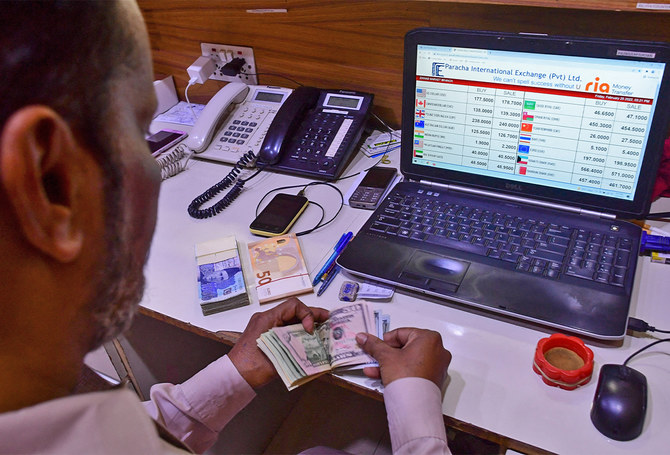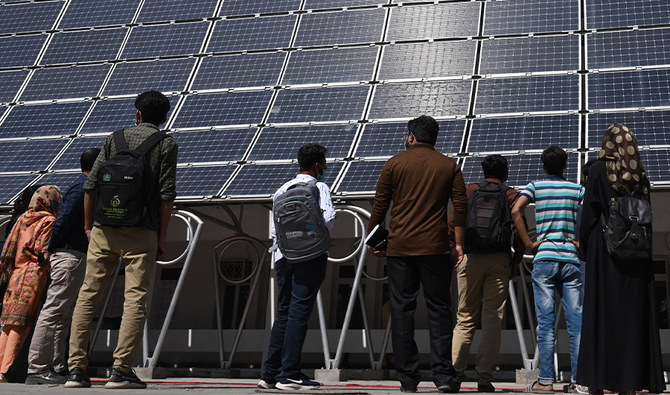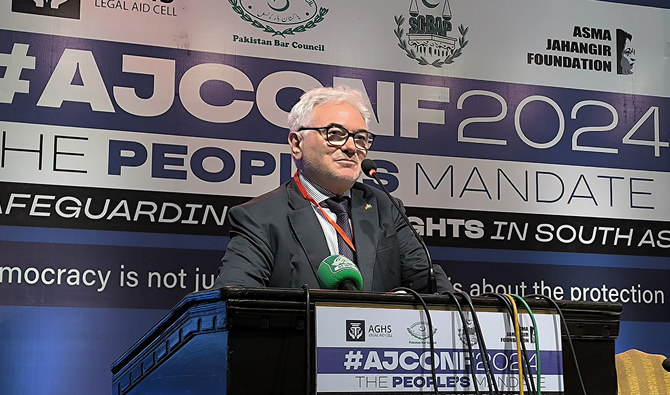KARACHI: Pakistan’s national currency dropped to another historic low of Rs182.19 against the US dollar, currency traders and analysts said on Monday, as uncertain political and economic situation continues to exert pressure on the rupee.
The national currency depreciated by 0.23 percent during Monday’s trading session in the interbank market, according to the data released by the State Bank of Pakistan. The dollar closed at Rs181.78 on Friday.
“Domestic politics, economic situation and global commodity prices are putting pressure on the Pakistani rupee,” Samiullah Tariq, research director at the Pakistan-Kuwait Investment Company, told Arab News.
Political uncertainty has been on the rise in Pakistan as Prime Minister Imran Khan faces a no-confidence vote in parliament. Pakistan’s trade deficit has widened by 82.18 percent to $31.9 billion in the current fiscal year from July-2021 till February 2022, amid rising imports which have also increased the demand for dollar.
The outflow of foreign currency worth $352 million to safe havens after the Russian invasion of Ukraine has also played a role in the depreciation of rupee.
“The demand for dollar is rising for import payments due to higher commodity prices in the international market,” Tariq said.
“As per the central bank data, foreign investors have sold $352 million worth of treasury bills and Pakistan Investment Bonds (PIBs) during the month of March so far, which is the highest monthly selling after April 2020 when bonds worth $601 million were sold.”
Currency dealers said the country’s dwindling foreign exchange reserves were also playing a crucial role in the strengthening of greenback against the rupee.
“The declining forex reserves are also exerting pressure on the rupee, amid increasing imports which have doubled as compared to the last year,” Zafar Paracha, general secretary of the Exchange Companies Association of Pakistan (ECAP), told Arab News.
During the week ending on March 18, Pakistan’s foreign exchange reserves decreased by $869 million to $14.96 billion due to external debt and other payments, according to a central bank statement issued on Thursday.
Paracha said the currency trading, particularly the trade of dollar, has declined by as much as $3 million per day from around $15 million in the open market, where the greenback was trading at Rs183 on Monday.
“Dollar has become more expensive and even those who remit dollars for education or treatment abroad are reluctant to buy,” Paracha said. “Political uncertainty is also compounding the situation.”
On the other hand, the country’s stock market remained bullish on hopes of a political settlement through parliament.
“Stocks closed higher amid speculations ahead of the National Assembly session to decide on the no-confidence motion,” said Ahsan Mehanti, chief executive officer (CEO) of the Arif Habib Corporation.
“Institutional support on a likely accord with the International Monetary Fund (IMF) after the 7th review under the Extended Fund Facility (EFF) and a slump in global crude oil prices played a catalyst role in the bullish close.”
Pakistan’s stock market closed 382 points higher at 43,933-point level, according to the data posted on the Pakistan Stock Exchange website.
Pakistani rupee slides to new all-time low amid political, economic uncertainty
https://arab.news/68ddr
Pakistani rupee slides to new all-time low amid political, economic uncertainty

- Outflow of $352 million invested in treasury bills, Investment Bonds exerting pressure on rupee, analysts say
- Pakistan equity market closes bullish on hopes of political settlement on no-confidence motion against PM Khan
Pakistan says net-metering promotes ‘unhealthy investments’ in solar power

- Government says massive solar installation is affecting 30 million consumers, imposing Rs1.90 per unit burden on them
- Experts say the government’s ‘regressive policies’ will make it difficult to cut fossil fuel and promote renewable energy
ISLAMABAD: The Pakistan government said on Saturday net-metering was promoting unhealthy investments in installation of solar power by affluent domestic and industrial consumers, hinting at cutting the buyback rates to discourage uptick in the sector.
The government approved the net-metering policy in 2017, allowing solar panel purchasers to sell power they produced to the national grid to spur the solar energy use and cut power shortages. Under the policy, the government is paying Rs21 per unit for the net-metered electricity which the government says is resulting in the subsidy of Rs1.90 per unit, burdening the government.
This development comes at a time when the price of solar panels has plummeted by more than 60 percent in Pakistan in recent weeks due to the bulk imports from China because of lower rates, making the country witness a surge in the solar power installation by domestic and industrial consumers to reduce their electricity bills.
“The present system of net-metering is promoting unhealthy investments in solar power,” the energy ministry said in a statement on Saturday. “Affluent consumers have been massively installing solar power due to which domestic, industrial consumers and the government have to bear the burden of Rs 1.90 per unit under the head of subsidy.”
The ministry warned the subsidy was affecting some 25 to 30 million “poor consumers,” and if the trend of the solar power continued, the bills of ordinary consumers would surge by at least Rs 3.35 per unit. However, it clarified no fixed tax was being imposed on the solar power.
The 2017 net-metering policy was aimed at promoting renewable energy in the system, which helped enhance the solarization in the country that now “needs to be balanced,” the ministry said.
Pakistan has ideal climatic conditions for solar power generation, with over nine hours of sunlight in most parts of the country. Utilizing just 0.071 percent of the country’s area for solar photovoltaic (solar PV) power generation would meet Pakistan’s electricity demand, according to the World Bank.
Currently, only 5.4 percent of Pakistan’s installed power generation capacity of 39,772 megawatts comes from renewables like wind, solar and biomass, while fossil fuels still make up 63 percent of the fuel mix, followed by hydropower at 25 percent, according to the National Electric Power Regulatory Authority (NEPRA).
The South Asian nation of 241 million aims to shift to 60 percent renewable energy by 2030 with 50 percent reduction in projected emissions, but it stands far behind in meeting the goal despite a recent surge in the solar power.
Energy experts said the government’s “inconsistent” solar power policies would result in discouraging the sector and its failure in meeting the national and international commitments of cutting the greenhouse gas emissions.
“Public sector the world over is promoting renewable energy to cut fossil fuel while we are discouraging consumers with regressive policies,” Aamir Hussain, chairman of Pakistan Alternative Energy Association, told Arab News.
He said the association had suggested the government to issue licenses to consumers for their actual household or industry load instead of allowing them to install massive solar power with a promise to buyback the surplus.
“The government should come up with an inclusive policy to promote renewable energy instead of discouraging consumers by slapping taxes or cutting the rates,” he added.
Babar Azam, Fakhar Zaman lift Pakistan to 178-5 in fifth T20I against New Zealand

- Azam scored a 44-ball 69 while Zaman made a 33-ball 43 for Pakistan after they were sent in to bat by Black Caps
- New Zealand won the third and fourth matches while Pakistan took the second after the first one was abandoned
LAHORE: Skipper Babar Azam notched a solid half century to guide Pakistan to 178-5 in the fifth and final Twenty20 international against New Zealand in Lahore on Saturday.
Azam scored a 44-ball 69 while Fakhar Zaman made a 33-ball 43 for Pakistan after they were sent in to bat at Qaddafi Stadium.
Azam saw his opening partner Saim Ayub fall in the second over for just one but that did not deter him as he added 73 for the second wicket with Usman Khan who made a brisk 24-ball 31.
Azam hit six boundaries and two sixes in his 34th T20I half-century before he was bowled by pacer Ben Sears in the 15th over.
Zaman hit four boundaries and a six before he was smartly caught by Mark Chapman on the boundary off Zak Foulkes as Pakistan managed 55 in the last five overs.
Shadab Khan hit a six and a four in his five-ball 15 not out.
New Zealand made three changes as they brought back Tim Seifert, Cole McConchie and Foulkes while pace spearhead Shaheen Shah Afridi returned for the home team.
New Zealand won the third and fourth matches while Pakistan took the second after the first in the series was abandoned.
New Zealand win toss, opt to bowl in 5th and final T20 against Pakistan

- Pakistan, looking to build-up for June’s T20 World Cup, are trailing 2-1 in the series
- Pakistan have brought in their ace fast bowler Shaheen Shah Afridi in place of Zaman Khan
LAHORE: New Zealand captain Michael Bracewell won the toss and elected to field in the fifth and final Twenty20 against Pakistan on Saturday.
Pakistan, looking to build-up for June’s T20 World Cup, are trailing 2-1 in the series as they tested their bench strength against the understrength Black Caps.
Pakistan made just one change from the team that lost the fourth match by four runs, bringing in their ace fast bowler Shaheen Shah Afridi in place of Zaman Khan.
New Zealand, touring Pakistan without their nine frontline T20 players who are in the Indian Premier League, made three changes.
Tim Seifert recovered from sore back and returns in place of Tim Robinson, who scored a half-century in the last game but was ruled out with a groin injury.
Cole McConchie and Zak Foulkes also made it to the playing XI replacing Dean Foxcroft and Jacob Duffy. Foxcroft was ruled out with a back injury.
The first game was abandoned because of rain before Pakistan bowled out New Zealand for 90 runs in the second game to win by seven wickets.
New Zealand made a comeback, winning the third match by seven wickets before edging out the home team in the last game at Qaddafi Stadium on Thursday.
Pakistani pro-Palestine protester says banned from rights conference after disrupting German envoy's speech

- The envoy was criticized for ‘lecturing’ on civil liberties when Germany was punishing defenders of Palestinian rights
- One of the organizers of Asma Jahangir Conference says no one should ‘insult people by shouting or getting harsh’
ISLAMABAD: A pro-Palestine protester in Pakistan, who interrupted German Ambassador Alfred Grannas during his speech on civil liberties in South Asia at a rights conference in the eastern city of Lahore on Saturday, said he was ‘manhandled’ by the organizers who later forces him out of the hall.
Ali Abdullah Khan, who studies economics and is part of the Progressive Students Collective, disrupted the German envoy’s speech at the popular Asma Jahangir Conference while accusing the European state of “brutally abusing” those who have been agitating for Palestinian rights.
Germany has clearly sided with Israel since the beginning of the war in Gaza after a surprise attack was launched by Hamas on Oct. 7 as a response to the deteriorating Palestinian condition living under Israeli occupation.
The conflict, which has led to the killing of over 34,000 Palestinians, has led to widespread criticism of the Israeli government, leading to protests in different parts of the world.
While countries like South Africa have accused the Jewish state of committing genocide in Gaza, German authorities have forcibly removed protest encampments and gone into people’s houses to arrest them for critical social media posts on charges of antisemitism.
“We were forced out of the place after we raised our voice during the German ambassador’s speech,” Khan said while speaking to Arab News. “The organizers manhandled us and banned our entry in the conference.”
He said it was “baffling” to see the German ambassador “lecturing” people on civil liberties in Pakistan after his country supplied arms and ammunition to Israeli military to kill Palestinian civilians and destroy hospitals and education institutions.
“Germany isn’t in a position to champion civil liberties and human rights when it is complicit in the killing of thousands of civilians in Palestine,” he continued. “We simply called out Germany’s hypocrisy by peacefully raising our voice in the conference that literally agitated the ambassador.”

Khan said he had peacefully expressed solidarity with the people of Palestine and would continue to do so until the western world remained “complicit in the brutal massacre of Palestinians.”
The Asma Jahangir Conference is named after a late Pakistani human rights lawyer and activist and brings together scholars, activists, legal experts and policymakers to discuss a wide range of issues affecting the lives of marginalized communities.
Responding to an Arab News query, Munizae Jahangir, one of the conference’s organizers and the daughter of Asma Jahangir, objected to the way Khan criticized the German envoy.
“Freedom of speech is everybody’s right, but there should be a decent way to ask questions or express your difference of opinion,” she said. “The purpose of the conference is to provide a platform to people to express their opinions, views and dissent, but one should not insult people by shouting or getting harsh.”
Jahangir, a prominent journalist and activist in her own right, said a special session on Gaza was held at the conference to highlight the issue that was attended by Shawan Jabarin, director of the Palestinian human rights organization Al Haq, and Francesca Albanese, the United Nations Special Rapporteur on the Occupied Palestinian Territories.
“We warmly welcome the difference of opinion at our platform but not the insult and disrespect to our honorable guests,” she added.
Earlier, Khan interrupted the German ambassador shortly after he began his speech.
“I am shocked by the audacity that you are here to talk about civil rights while your country is brutally abusing the people speaking for the rights of the Palestinians,” he shouted while standing at the back of hall.
Many people around him supported him by shouting “Free, Free Palestine” and “From the River to the Sea.”
The German envoy, who looked visibly perturbed by the development, responded by shouting back at him and pointing to the exit.
“If you, if you want to shout, go out,” he said. “There you can shout. Because shouting is not a discussion.”
Last year in November, a Pakistani classical dancer and human rights activist Sheema Kermani raised slogans for a ceasefire at a British Deputy High Commission event in Karachi and later complained of being “escorted out.”
Gunmen abduct judge in Pakistan’s northwest amid surge in militant violence

- Khyber Pakhtunkhwa chief minister says ‘emergency measures’ must be taken to bring back the judge
- Police say a heavy contingent has gone to the area to gather evidence and identify the armed men
PESHAWAR: Unidentified gunmen abducted a district and sessions court judge in Pakistan’s northwestern Khyber Pakhtunkhwa (KP) province on Saturday as he was traveling from his hometown of Tank to the southern Dera Ismail Khan district, according to a police official.
The incident has alarmed the legal community and coincides with a resurgence of militant violence in KP and Balochistan provinces, following the Tehreek-e-Taliban Pakistan (TTP)’s termination of a fragile truce with the government in November 2022.
“Shakirullah Marwat, the district and sessions judge in South Waziristan, was kidnapped near Bagwal, a dusty town between Tank and Dera Ismail Khan,” said Muhammad Ibrahim, a police spokesman. “The kidnappers released Marwat’s driver but took the judge with them.”
Ibrahim added that a heavy police contingent was dispatched to the area immediately after the incident to collect evidence and search for the armed men.
Earlier this month, an attack in Dera Ismail Khan resulted in the death of six people, including five customs department officials, with another person wounded when gunmen targeted their vehicle.
Shah Fahad Ansari, a high court advocate and the divisional president for the People Lawyers’ Forum, condemned the abduction, saying that courts across the region should be locked down in protest to draw attention to the deteriorating law and order situation.
“The provincial government has completely failed to maintain security in the area,” Ansari added. “You can imagine the sense of insecurity among people at a time when the state cannot even protect its judges.”
Reacting to the development, KP Chief Minister Ali Amin Gandapur instructed the police to ensure the safe recovery of the judge.
“Emergency measures must be taken to recover the judge, and all available resources should be utilized for this purpose,” he said in a statement.
Gandapur maintained the people who were behind the incident would not be able to escape the law.
The recent weeks have also seen attacks on police officials in KP.
Earlier this month, a policeman was shot dead in North Waziristan. In related incidents, an official from the provincial counterterrorism department and a senior cleric affiliated with the Jamiat-e-Ulema-e-Islam religious party were fatally shot in target killings in the area.
While no group has claimed responsibility for these attacks, suspicion has fallen on the TTP, whose leadership is said to be based in neighboring Afghanistan.
The Afghan deputy interior minister, Mohammad Nabi Omari, urged Pakistan and the banned militant network to resume negotiations earlier this month, but Pakistani authorities rejected this idea, calling on the administration in Kabul to act against militants operating from its soil.










